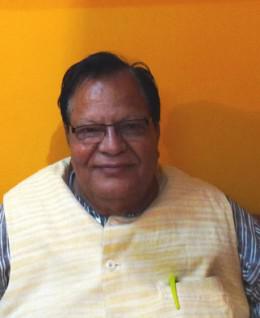Dichter
Kamlesh

Kamlesh
(India, 1937)
© Atul Dodiya
Biografie
Kamlesh (born 1937) is a senior Hindi poet and translator. He writes prolifically but publishes sparingly. His two collections of verse include Jaratkaroo (1985) and Khule Mein Aawaas (2008). Hindi poet Udayan Vajpeyi describes him as “one of the most well-read writers of his generation”. He lives in Delhi.
Born in a village in Uttar Pradesh, Kamlesh studied in Gorakhpur, but did not complete his formal education. In the late 1950s, he became assistant editor of Kalpana, a leading journal of Hindi literature. He was associated with the Indian socialist leader, Ram Manohar Lohiya for many years, and was one of the editors of Pratipaksh, an important socialist journal. Udayan Vajpeyi describes his work as “thinking poems . . . rich in texture and memory”.
‘Inability’, a poem from his first collection (translated by poet Teji Grover), is a quiet meditation on memory, its vacancies and erasures. On the one hand, the poet is capable of recreating an entire city in his mind – “building new houses, new quarrels, doors and streets, all new”. But on the other, he admits to the limits of his invention, to the piecemeal nature of human achievement. There are and will always be, he realises, gaps, blanks, “empty spaces” that cannot be filled by recollection or imagination: “In every attempt some patches remain empty/ where just anyone could come and dig a hole,/ let thorns grow.”
‘Delhi Summer, Early Afternoon’, also from the same book, is a poem in praise of a season for all seasons. It enshrines a familiar and timeless moment in Delhi, peaceful, unchanging, sun-soaked; a moment complete enough to accommodate every contradiction, a moment inclusive enough to encompass the desires of those courting love or death, beginnings or endings. It ends with the gentle blessing: “Let trees remain standing out there unmindful, in the open air.”
There is a haunting quality to these poems, a preoccupation with instants of pause and stillness in a metropolis that would customarily be viewed as frantic and relentless. What makes this interesting is the fact that these silences and holes do not turn sinister or apocalyptic. Instead, the poet seems to have made his peace with these moments of stasis, weaving them into the fabric of a poetic world where human habitation and empty spaces, fields and bazaars, fire and ice, life and its cessation, can serenely coexist.
‘Inability’, a poem from his first collection (translated by poet Teji Grover), is a quiet meditation on memory, its vacancies and erasures. On the one hand, the poet is capable of recreating an entire city in his mind – “building new houses, new quarrels, doors and streets, all new”. But on the other, he admits to the limits of his invention, to the piecemeal nature of human achievement. There are and will always be, he realises, gaps, blanks, “empty spaces” that cannot be filled by recollection or imagination: “In every attempt some patches remain empty/ where just anyone could come and dig a hole,/ let thorns grow.”
‘Delhi Summer, Early Afternoon’, also from the same book, is a poem in praise of a season for all seasons. It enshrines a familiar and timeless moment in Delhi, peaceful, unchanging, sun-soaked; a moment complete enough to accommodate every contradiction, a moment inclusive enough to encompass the desires of those courting love or death, beginnings or endings. It ends with the gentle blessing: “Let trees remain standing out there unmindful, in the open air.”
There is a haunting quality to these poems, a preoccupation with instants of pause and stillness in a metropolis that would customarily be viewed as frantic and relentless. What makes this interesting is the fact that these silences and holes do not turn sinister or apocalyptic. Instead, the poet seems to have made his peace with these moments of stasis, weaving them into the fabric of a poetic world where human habitation and empty spaces, fields and bazaars, fire and ice, life and its cessation, can serenely coexist.
© Arundhathi Subramaniam
BibliographyKhule mein Aawaas, Rajkamal Prakashan, New Delhi, 2008 (ISBN 978-81-267-1489-6)
Jaratkaroo, Satvahan Publications, New Delhi, 1985
Links
Pratilipi: Some more of Kamlesh’s poems in translation
Gedichten
Gedichten van Kamlesh
Sponsors
























